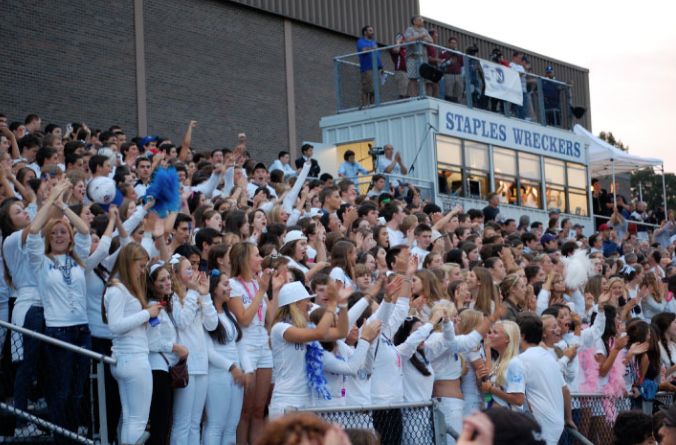Not long ago, Staples SuperFans stood on their seats silhouetted under the new lights at the football field, packing the bleachers with blue, white, and unrivaled confidence.
Now, five months later, the blues and the whites are fading—the trademark confidence is dying. Those who were once SuperFans are super no more. They have met their match, their Achilles’ heel—a SuperFan’s kryptonite.
Staples has no winning team.
“I wouldn’t call Staples kids frontrunners because, no matter what, they’re going to root for Staples success,” Andrew Felman ’14, a co-president of SuperFans, said. “I would just call them success-watchers.”
Regardless of their label, the reality speaks for itself. According to Stephen Colodny ’13, the group’s other co-president, these “success-watchers” aren’t watching anything at all.
“There’s just a general lack of unity between grades,” Colodny said. “I know that my class has always been at sporting events, but I’m still trying to figure out why the underclassmen don’t go.”
And Matt Thibodeau ’13, a fellow fan, has taken notice of that as well.
“Only juniors and seniors are coming to games,” Thibodeau said. “There are zero freshmen.”
Nicolas Amato ’16 attributes his grade’s lack of attendance to their general fear of the senior class.
“I went to the first game, but I haven’t been back since,” Amato said. “The seniors are intimidating because of their high levels of pep; they’re very intense. I could never compete with that.
Still, to Colodny, any empty seats can hurt the team’s performance.
“It’s an advantage for our teams if we are able to support them,” Colodny said. “It’s a disservice to our teams when, at home games, the other fans are louder than us.”
For Jack Mendillo ’15, this scene is all too common. Mendillo plays for the Staples hockey team—a team with a notoriously low fan base. According to him, SuperFans carry a significant importance.
“Skating out of the tunnel for warm-ups with only a couple of fans at the game can be pretty demoralizing,” Mendillo said. “Having a ton of fans cheering us on would definitely give the team a much-needed boost.”
Despite the demand for fans, according to Felman and Colodny there’s not much else to be done—they’ve already ordered apparel and made events on Facebook. The last factor, they say, is the infamously passionate Matty Campbell ’13.
Over the course of this year, Campbell has made his presence known on the SuperFan Facebook page—a 565-member group still growing by the day. While there is debate as to whether or not his posts have a positive effect on the crowd, Campbell says his motivation has stayed consistent.
“If you’re a student in a high school full of sports programs like ours, you should want to partake in the excitement surrounding games,” Campbell said. “But I guess you can’t force people to want that.”
According to Campbell, the turnout this year has been substandard at best. He calls to mind the state semi-final football game, perhaps this year’s biggest game for this year’s most successful team, when the only fans who showed up were a select group of 25 seniors. This lack of dedication to the Staples teams has led him to brainstorm new tactics to draw crowds.
“Maybe we should use reverse psychology and say ‘Don’t go to the games, they’re going to suck,’” Campbell said. “That sure won’t be perceived as bullying.”
Although Campbell likely won’t follow through with this particular strategy, the co-presidents of SuperFans aren’t so sure about the Facebook posts on the whole. While Colodny declined to comment, Felman says the group hasn’t affected turnout at all. According to him, the event pages have proven most effective.
Still, despite event pages or Facebook posts—even despite defeat—Thibodeau will still be wearing the blues and whites in the bleachers.
“You only experience high school once,” Thibodeau said. “Later on, sporting events are going to be your great memories. I have to go while I can.”














































